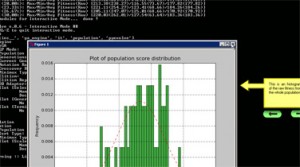I’ve made a video of an example using the Pyevolve’s Interactive Mode in the middle of the evolution of a Genetic Algorithm. The video is in high resolution, so you can see it here or clicking on the image below:
There is a portuguese version of this post.
Evolutionary computing (EC) has been widely used in recent years, and every year there are new applications for the techniques developed, despite being a relatively new area, few people are giving attention to that (at least in my vision and I will explain why) probably will have a promising and revolutionary future in relation to how we can generate innovation and even learn from it, especially as it relates to Evolutionary Algorithms (EAs).
There is a portuguese version of this post here.
I am a big fan of the Karl Popper’s philosophy of science, so I decided to write something about what I find interesting in his philosophy, especially in relation to rational criticism, to talk later a little bit of what I think about this in relation to Evolutionary Algorithms (EAs).

Popper, in his book “In Search of a Better World” (the original title is “Auf der Suche nach einer besseren Welt“), cites the importance of rational criticism in science and combat the dogmatism of belief in the scientific authority. For me, this idea, despite intrinsic in the thoughts of many philosophers, was not so clearly exposed as Popper did, the clarity with how Popper gives us the insight about how the science grows and improves through rational criticism is remarkable, and I’ll try to summarize here what he tried to explain for almost whole life.
Sou um grande fã da filosofia da ciência de Karl Popper, desta maneira, resolvi escrever algo sobre o que eu acho interessante na filosofia dele, principalmente em relação à crítica racional, pra depois falar um pouco do que acho sobre isto em relação aos algoritmos evolutivos em geral.
Popper, em seu livro “Em busca de um mundo melhor“ (o título original é “Auf der Suche nach einer besseren Welt“), cita a importância da crítica racional na ciência e combate o dogmatismo na crença da autoridade científica. Para mim, esta idéia, apensar de intrínseca no pensamento de muitos filósofos, não foi tão claramente exposta como Popper o fez, a clareza com que Popper nos apresenta a idéia sobre como a nossa ciência cresce e melhora através da crítica racional é notável e vou tentar resumir aqui o que ele tentou explicar por quase uma vida.

